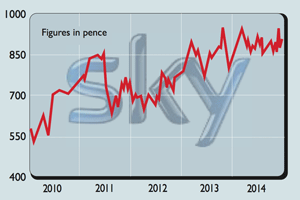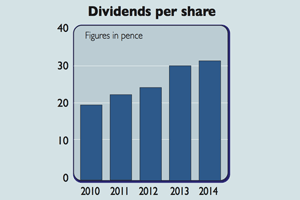Shares in focus: Has Sky reached its limit?
On the face of it, broadcaster Sky is doing well. So, should you snap up the shares? Phil Oakley investigates.
Get the latest financial news, insights and expert analysis from our award-winning MoneyWeek team, to help you understand what really matters when it comes to your finances.
You are now subscribed
Your newsletter sign-up was successful
Want to add more newsletters?

Twice daily
MoneyWeek
Get the latest financial news, insights and expert analysis from our award-winning MoneyWeek team, to help you understand what really matters when it comes to your finances.

Four times a week
Look After My Bills
Sign up to our free money-saving newsletter, filled with the latest news and expert advice to help you find the best tips and deals for managing your bills. Start saving today!
If the satellite TV company loses its football rights it could be in trouble, says Phil Oakley.
For the best part of 25 years, Sky has been proving its doubters wrong. When it launched in 1990, many thought the satellite TV company would not survive. Its process of transformation into a major media company began in late 1991 when it spent just over £300m to broadcast live football matches from the newly formed English Premier League (EPL).
Its investment in the rights to live sports events, films and entertainment has paid off handsomely. Competition for its dominance of English football TV rights from rivals such as ITV Digital, Setanta and ESPN was quickly seen off.
MoneyWeek
Subscribe to MoneyWeek today and get your first six magazine issues absolutely FREE

Sign up to Money Morning
Don't miss the latest investment and personal finances news, market analysis, plus money-saving tips with our free twice-daily newsletter
Don't miss the latest investment and personal finances news, market analysis, plus money-saving tips with our free twice-daily newsletter
In recent years the company has also been selling telephone and broadband internet services to its customers, which has kept many of them loyal and its profits steadily rising.
And at the end of last year, Sky set its sights on becoming a major force in European pay TV by taking control of Sky Italia and Sky Deutschland. So you could be forgiven for thinking that everything in the garden was looking rosy.
Yet Sky may never have been more vulnerable as it is today. That's down to one particular competitor BT. The once-moribund telecoms company has now emerged as a major competitive threat to Sky's business.
The fear among investors is that Sky's competitiveness could take a major hit in the coming months, meaning its share price could be heading for a fall. So will Sky again see off the sceptics and keep on delivering? Or is it time to sell?
The outlook
However, lots of people are concerned about whether profits can keep growing. The problem is that Sky faces lots of threats to its business right now. The biggest of these is whether it can continue to dominate live TV coverage of EPL football. This is vital to its pay-TV business.
Without the lion's share of these matches it could lose a large chunk of its customers and might also be forced to cut its subscription prices. Under this scenario its profits could fall a long way.
So investors will be keeping their eyes peeled over the next few weeks which is when the rights for the period stretching from 2016 to 2019 will be awarded.
At the moment, Sky has the rights to 116 matches per season, while BT has 38. But BT is now using sport as a successful way to defend and grow its very profitable broadband business, which Sky has been trying to take from it.
BT has already agreed to pay nearly £900m for exclusive rights to the Champions League from August this year, and many industry experts expect it get a bigger share of the next batch of EPL matches.
BT is in a strong position to beat Sky. It has more than twice the operating profits and free cash flow of its rival and so is well placed to turn the screws on Sky. Sky is not flush with cash after spending £5.6bn to buy Sky Deutschland and Sky Italia, and it has debts of around £4.5bn. So it might not be able to put together a massive knockout bid.
Instead it may have to bid smarter by focusing on the popular Sunday afternoon matches although whether this would keep customers loyal is by no means certain.
BT isn't the only threat
Sky also doesn't offer its customers mobile-phone services (the so-called quadplay' package of TV, phone, internet and mobile) and this could add to its difficulties should BT complete its purchase of EE and gain an extra 20 million-plus customers with it.
Then there's the move into Italy and Germany. Sky has spent a lot of money here, so it is going to have to work hard to make these investments pay off. Sky Deutschland is losing money while Sky Italia's profits have stagnated in recent years.
But could a white knight come along to help Sky out? Possibly. Vodafone is embroiled in a similar struggle to keep hold of its customers. It is going to offer home broadband services in the UK this year and has hinted that it might be interested in getting its hands on some exclusive entertainment content.
A partnership with Sky or even a takeover could help both companies, allowing them to offer quadplay services to take on BT and to pay for the vital football rights.
So what should you do with Sky shares? All the worries I have discussed here are well known, but the share price has so far proven very resilient. A takeover would need the approval of 21st Century Fox (it has a 39.2% stake) and Rupert Murdoch but it is possible and it might explain why the share price has held firm.
Either that, or the market believes that Sky will defy the sceptics again and retain its football rights, without paying a ridiculous amount for them.
Whatever happens, Sky is not cheap at more than 16 times forecast earnings. A setback doesn't seem to be priced in, whereas a successful outcome might well be. On balance, the shares don't offer an attractive mix of risk and reward.
Verdict: avoid
Sky (LSE: SKY)


Directors' shareholdings
Get the latest financial news, insights and expert analysis from our award-winning MoneyWeek team, to help you understand what really matters when it comes to your finances.
Phil spent 13 years as an investment analyst for both stockbroking and fund management companies.
-
 Should you buy an active ETF?
Should you buy an active ETF?ETFs are often mischaracterised as passive products, but they can be a convenient way to add active management to your portfolio
-
 Power up your pension before 5 April – easy ways to save before the tax year end
Power up your pension before 5 April – easy ways to save before the tax year endWith the end of the tax year looming, pension savers currently have a window to review and maximise what’s going into their retirement funds – we look at how